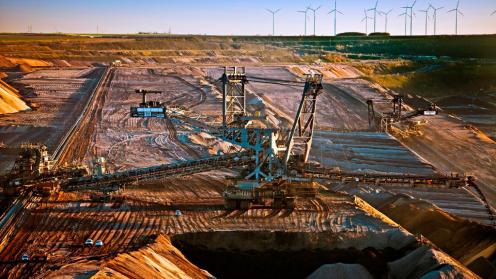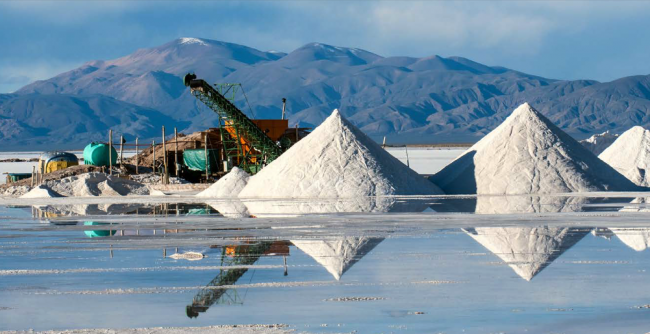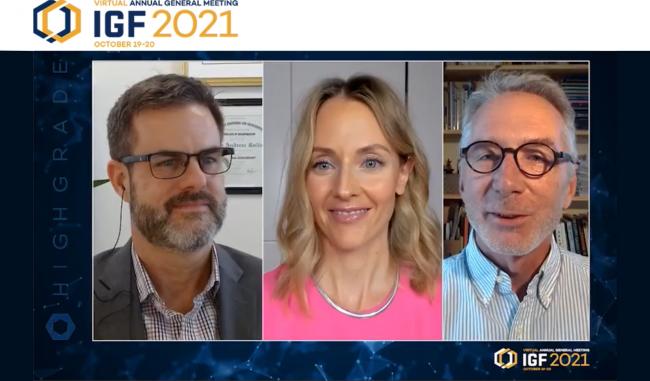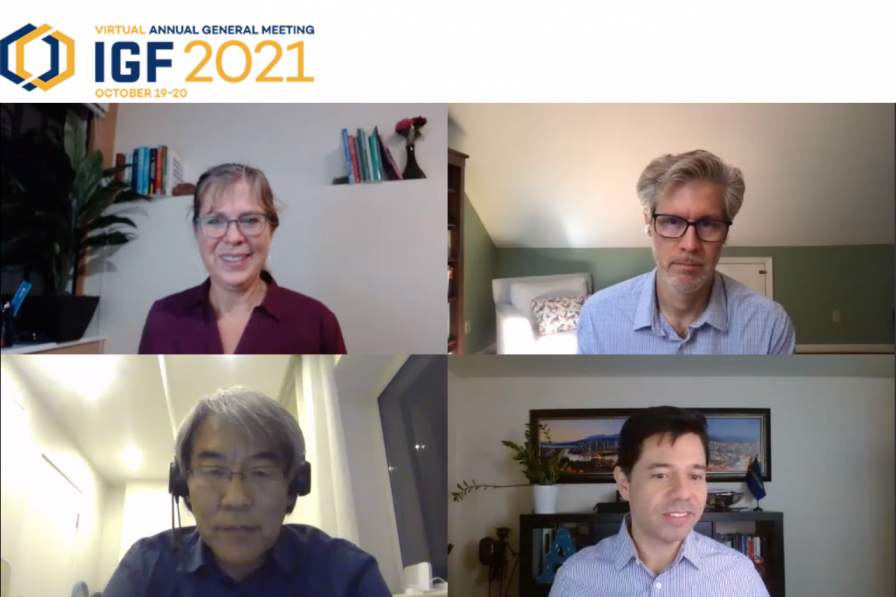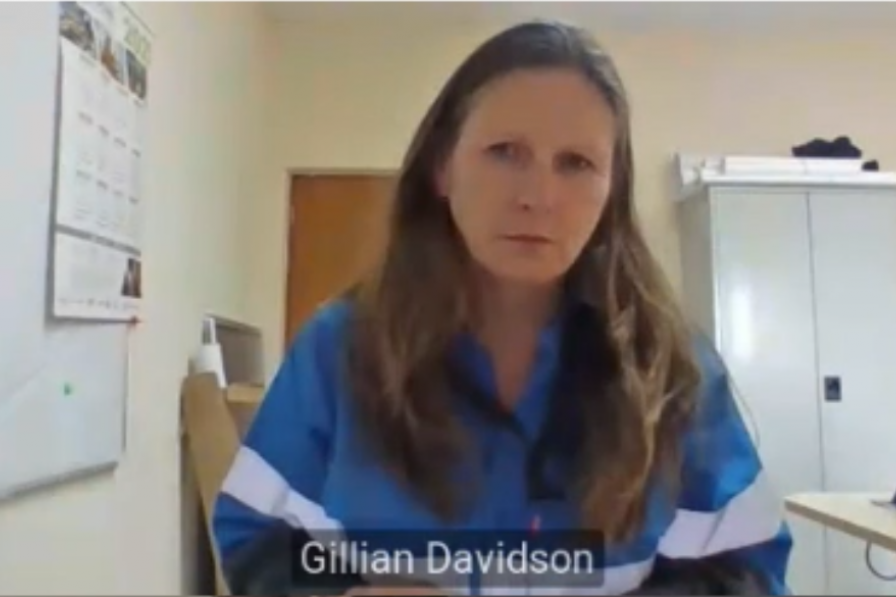The second and final day of the 17th Annual General Meeting (AGM) of the Intergovernmental Forum on Mining, Minerals, Metals and Sustainable Development (IGF) focused on: public-private collaboration; mine tailings governance; critical minerals for the global energy transition; local content and regional supply chains; global trends that will shape the future of mining; and relationships for improved mining environmental governance.
During a session on “Building on post-COVID emergency responses to strengthen public-private collaboration,” Froydis Cameron-Johansson, Group Head of International Government and Sustainability Relations, Anglo American, discussed her company's experience during the COVID-19 pandemic, identifying actions taken to safeguard their workforce and local communities. She shared lessons learned such as the importance of partnering with host governments, and ensuring the mining sector remains agile, technology-innovative, and flexible.
A session on mine tailings governance identified some causes of tailings dams failures, including problems with design, construction, monitoring and maintenance, and, ultimately, tension between the cost of construction and operation, and investment in safety. Participants heard from Andrew Rollo, Chief Auditor of Mines, Executive Director Audit and Effectiveness at British Columbia Ministry of Energy, Mines and Petroleum Resources. He described some of the actions undertaken by the British Columbia Government following the Mount Polley tailings dam collapse in 2014, including amending the tailings storage facility-related provisions of the Health, Safety and Reclamation Code for Mines in British Columbia.
In the session on “Critical minerals: opportunities and challenges in the Race to Zero,” K.C. Michaels, International Energy Agency, told participants that concerted effort to meet global climate goals will require four to six times more mineral inputs in 2040 than today, primarily due to increased mineral demand for electric vehicles and battery storage. Anna Shpitsberg, US Department of State, discussed the Energy Resource Governance Initiative, which was created to ensure the clean energy mineral supply chain is diverse, resilient, and adheres to the highest environmental social and governance standards. Jerry Kwame Ahadjie, Chief Minerals Officer, African Development Bank, then presented on Africa’s critical minerals opportunities and the Bank’s efforts to promote these.
During a session on local content and regional supply chains, panelists Sulemanu Koney, CEO, Ghana Chamber of Mines, and Nick Maennling, GIZ, agreed that COVID-19 taught mining companies in West Africa and the Andean region that diversifying suppliers is critical, but that true regional or sub-regional cooperation on local content rules remains a long way off. The two suggested cooperation is more likely in terms of: skills promotion related to increased mining automation/digitalization; local cross-border cooperation on specific challenges such as water supply; development of supply clusters; and support for sub-regional development of trade infrastructure.
The session on global trends that will shape the future of mining focused on issues such as the COVID-19 pandemic, climate change and the low-carbon energy transition, and how the mining industry is navigating these trends. Charles Dumaresq, Mining Association of Canada, discussed what mining companies are doing to achieve net zero emissions, including moving from diesel power generation to renewable energy use, and increased use of electric vehicles. Speakers also discussed the role of minerals in the low-carbon transition, with James Cust, World Bank, highlighting that governments of resource-rich countries need to make themselves responsive and attractive to the mining industry.
During the session on “Building relationships to improve environmental governance in mining,” panelists Galbadrakh Davaa and Bruce McKenney from The Nature Conservancy discussed lessons learned from their involvement in national landscape-level conservation planning in Mongolia. Peruvian consultant Nancy Bahamonde Quinteros discussed participatory environmental monitoring committees in Latin American mining, with a particular focus on Peru. Davaa and McKenney identified key elements for a successful conservation planning exercise as:
- a truly inclusive and participatory process to build buy-in;
- proactive communication of results;
- having government champions and whole government buy-in;
- integration of conservation planning tools into national and regional land use planning;
- an active role for the mining industry;
- factoring in local community livelihoods and empowering communities afterward to follow-up protection of their lands; and
- inclusion of women and youth at all stages.
Bahamonde identified key challenges facing participatory environmental monitoring committees in mining, including: ensuring follow-up; limited technical understanding of committee members; financial sustainability of committee work; and inclusion. Among the solutions she suggested was allocating a portion of mining royalties to support committee work and capacity building, or asking mining companies to create a trust fund for that purpose.
In closing remarks, Greg Radford, Director, IGF Secretariat, noted recent challenges have given rise to many new partnerships that would otherwise not have been formed. He pointed to more opportunities for government, industry and communities to partner together to build a better future. Kitty van der Heijden, Director General for International Cooperation, Ministry of Foreign Affairs, the Netherlands, called for: climate-smart mining policies; gender-responsive policies and practices; and practices that address the unequal distribution of mining costs and benefits. Rohitesh Dhawan, President and CEO, International Council on Mining and Metals, said the world is going through an energy transition and the mining sector is at the heart of it.
Thanking everyone for their participation and contribution, Isabelle Ramdoo, Deputy Director, IGF Secretariat, closed the AGM at 10.57am EDT.
To receive free coverage of global environmental events delivered to your inbox, subscribe to the ENB Update newsletter.
Selected Images
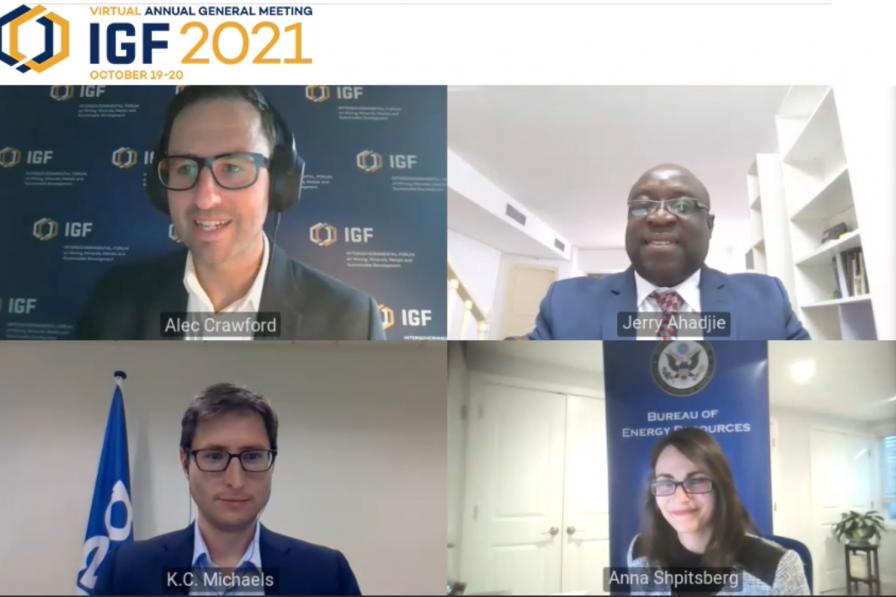
Clockwise: Alec Crawford, IGF Secretariat; Jerry Kwame Ahadjie, African Development Bank; Anna Shpitsberg, US Department of State; and K.C. Michaels, International Energy Agency
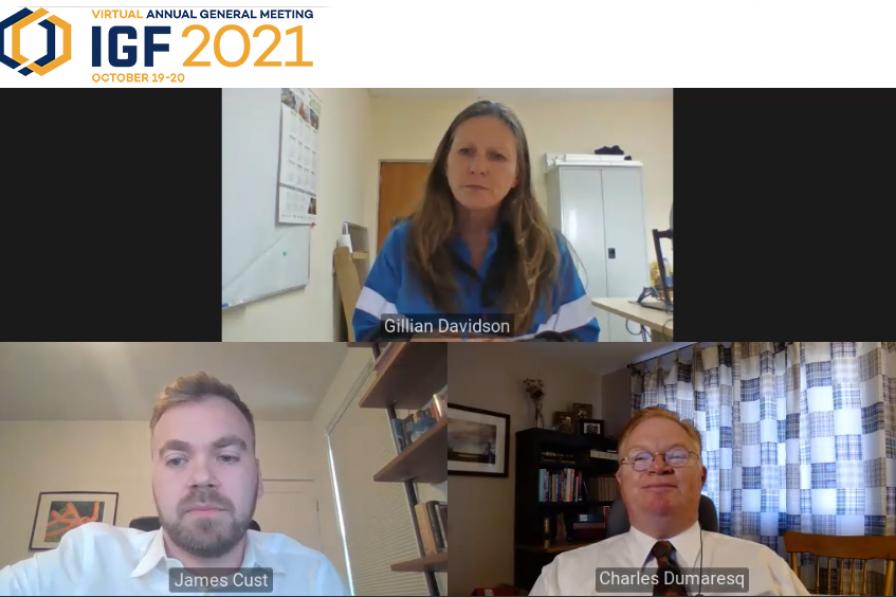
Clockwise: Gillian Davidson, Executive Sustainability, ESG, and Responsible Supply Chain Advisor; Charles Dumaresq, Vice President, Science and Environmental Management, Mining Association of Canada; and James Cust, World Bank
